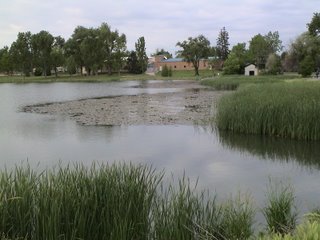
JoAnne Ditmer's column, "Selling our parks," which appeared in this morning's Denver Post advises that, "The city's park system has an estimated $90 million backlog of capital and maintenance needs."
To give you some sense of the enormity of Denver's park system, Ms. Ditmer points out that, "Denver Parks and Recreation has 202 named parks and 30 recreation centers, 16 outdoor swimming pools, six golf courses, a skate park and about 100 unnamed parcels. An updated inventory of the entire system is underway. Named parks, parkways and golf courses total 5,696 acres. The 24 mountain parks have 13,500 acres, including Red Rocks. Parks and Recreation's budget is almost $45 million in public money, up from $44 million in 2005. "

The main thrust of Ms. Ditmer's column is to expose suggestions that putting Denver's parks up for sale to the highest bidder (not the park itself, but naming rights, corporate sponsorship of events, projects and sites) is a decidedly "ethical slippery slope." Major objections to this kind of commercialization of Denver's parks is just that: the commercialization of our parks as well as the inevitable corporate cluttering of our precious open spaces.
Ditmer's column included a quote from Denver's mayor, John Hickenlooper: "Parks are points of reflection, inspiration, where you might go when you're trying to make a decision."
It's probably irrelevant to note that Hickenlooper generally goes to massive committees or high-priced consultants to make his decisions (no, the buck doesn't stop with Hickenlooper. Never has and probably never will!)
I wonder when last Hickenlooper actually visited a public park? Parks are much, much more than backgrounds for contemplative musing. They're vital, busy, robust centers for community interaction and play and recreation and... Well, I think the rest of us understand what parks are and what actually happens in them.
Ditmer mentions that another way to raise money for park improvements is to form a conservancy for a particular park. Conservancies are usually made-up of folks who seem to have a little extra time and a whole lot of cash on their hands and come up with--what in Denver has been--secret plans for park improvements. Witness my recent post on the Civic Center Conservancy plan for Civic Center Park. What a nightmare.
There are "Master Plans" for several park improvements around the city. I know of at least two in my neighborhood: Berkeley and Highland Parks. Master Plans are really cool conceptual, living color, visions from architects, planners of what a particular park might look like if improvements were actually made to the parks. Neighborhood groups ooo and ahhhhh at these pretty documents. But, unfortunately, when asked how these improvements are going to be financed, the politicians smile and give you the schpiel about general obligation bonds and capitol improvement project funding (CIP) which, sadly, comes from the city's general fund.
Now, the city goes to the voters with general obligation bond questions about once every ten to fifteen years. Then it takes about the same amount of time (or a little less) to actually implement and finish the project if the bonds are approved. And, of course, no community, no neighborhood is guaranteed that their pet project is going to be included within a general obligation bond ballot question. It's the politicians who decide that. And, don't you just know that all those political markers held by Denver's City Councilmen/women against one another are extremely valuable come time to determine what to put on general obligation bond ballot questions.
$90 million deficit for infrastructure maintenance and projects in Denver's parks. That's shameful.
Ditmer's final point is that the Hickenlooper administration is sorely in need of some "...transparency and honesty in planning the future of Denver's parks."
Indeed.
No comments:
Post a Comment